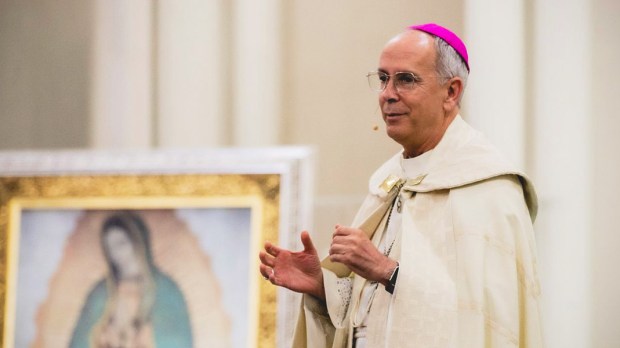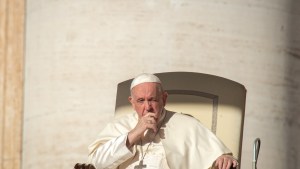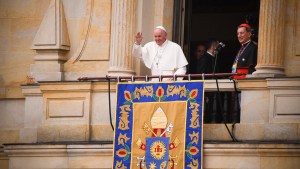On November 28, 2022, Bishop Mark Seitz of El Paso woke up to a pleasant surprise. As he checked his Twitter account he saw that he had been cited in an interview as an example of a “good pastor,” who “grasps all the contradictions” of his diocese and “carries them forward.” The 68-year-old Bishop was shocked to discover that the person praising him was Pope Francis himself in an interview with America Media.
Bishop Seitz, who has been leading the Diocese of El Paso since 2013, spoke to Aleteia about what it was like being complimented by the Pontiff and how he envisions his role as a pastor in this complex diocese on the border between Mexico and the United States.
How did you find out about the Pope’s comments and what was your reaction to this praise?
Bishop Seitz: It was quite a startling thing to awaken to. I was not expecting it at all and I was shocked. I went through a whole spectrum of emotions when I heard the Holy Father had mentioned my name. I feel very honored and somewhat embarrassed to be singled out in that way for my ministry. I admire the work of so many of my brother bishops in the United States and elsewhere so it is certainly very humbling to think I would be mentioned, when so many others could be.
Pope Francis said you are a man who “grasps all the contradictions” of the region you are in. Can you paint a picture of your area and the issues that affect it?
Bishop Seitz: It is a rather unique place. I think we are perhaps the largest binational community in the world because we have the El Paso area, which consists of about 850,000 people and then Ciudad Juárez on the other side, which has a population of 1.5 million or more. The [Rio Grande] river has been the border through the centuries and it never really did much to separate us; now even less so as there is almost no water left, it is ankle deep most of the time. Unfortunately we do have a very foreboding fence now that divides us, sometimes with barbed wire on top. We are still really interconnected though: Our children go to school on both sides, people work on both sides. Also the pride of belonging to both nations is something rather special about this region.
It is a place, as the name El Paso would suggest, of welcome, where people are passing through. That is part of our DNA: to receive and welcome people. One can see what can happen when a border area isn’t a place of confrontation, as most people see it, but a place of encounter. In El Paso we have an opportunity to reflect on the ideal the Church presents of being a community that transcends borders; where we can recognize every person, no matter their origin, race or religion, as brothers and sisters. While we recognize the right and value of nations having lines that delineate where this state ends and the other begins, I think we also recognize here, better than in most places, that there are even more important things that unite us, than those who separate us.
While we recognize the right and value of nations having lines that delineate where this state ends and the other begins, I think we also recognize here, better than in most places, that there are even more important things that unite us, than those who separate us.
In the interview, Pope Francis highlighted that bishops should be pastors, rather than ideologues. In a politically charged region like yours, how do you think a bishop can focus on being a pastor, while paying the right attention to the needs of his faithful?
Bishop Seitz: The main thing is that we have to remember who we are, that indeed we are pastors, we are servants of the Gospel. While many of our actions may be interpreted as political, by people who see everything as political, we have to be focused on listening to Jesus and his teaching through the Church. That connection will come through for those who are willing to see. That is what I am trying to do. I can’t allow myself to be afraid of speaking because I think there will be political pushback.
By the same token though, I am not a politician, I am not running for office or developing laws. I am simply trying to speak to what the teaching of the Church is and to express those underlying principles that should guide the conscience of those who are developing laws and policies on behalf of the nation.
I am also trying to form my people to be fully Christian, which is not easy today, neither for the people nor for the bishop. I am trying to do work, which I feel so privileged to do, and I am so edified that the Pope would highlight that that’s my ministry because it is exactly what my aspiration is.
Migration and identity are themes and issues that Pope Francis pays close attention to. Do you think this is also a reason why he may have singled you out in the interview?
Bishop Seitz: Yes, I am certain that it is something that keeps this region very much in the Pope’s consciousness. Having also been here to the border himself [during his 2016 trip to Mexico], I think he feels a certain closeness.
The Catholic Church has had a long history of working on this border. I have really tried to highlight the importance of this to help challenge the narratives that are so prominent here in our country that say “those people coming are a threat to us”; “it is an invasion”; “criminals are crossing the border”; etc. The vast vast majority of those who come are certainly not criminals. They are just people looking to escape life threatening situations and find a place where they can live and raise their families in peace. To characterize a whole group of people based on a very small percentage, who really should be stopped at the border, is not very fair. We have really tried to tell our story from the border and perhaps it came to the Pope’s attention.
Pope Francis said you carry forward the difficulties of your diocese as a pastor. What do you think inspires you in your role as a Bishop and helps you stay focused on your mission?
Bishop Seitz: Well I think it has been more and more clear to me that this work would be impossible without the help of God. The problems that we are dealing with in the world today and which are part of our society, such as the tsunami of secularization, the loss of faith, the tendency to view everything as the politics of the day, the anger, hurt and violence experienced and so on, make it very challenging to be a pastor. They bring me to my knees, literally. I need to spend time to keep my spiritual life focused, if I am going to continue to do this work and not be discouraged or embittered, but be a joyful servant in this midst of this broken world.
Did the Pope’s words make you feel encouraged in your mission?
Bishop Seitz: Absolutely, he has been such an encouragement for me in my ministry both in terms of his teaching in general but also in the different ways he has supported me in this mission. It is just something that I would have never imagined to have come my way. In a certain sense it worries me a little bit because I ask myself: Is God preparing me for something even more challenging than what I am facing now, by receiving this affirmation as I go forward?
I don’t know but I am just hopeful that I can serve God. Much of what the Pope said is aspirational to me, not that I have accomplished it, but as what I would like to be.
So, thank you Holy Father!



